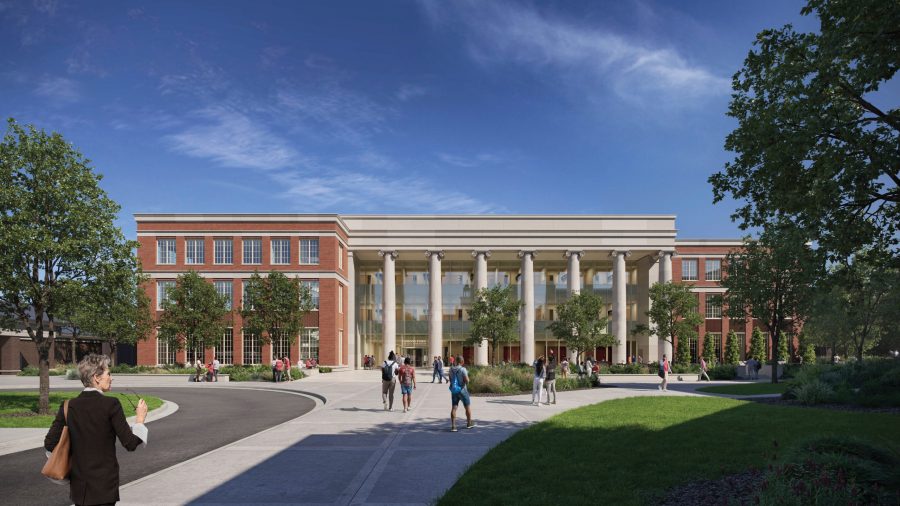
It’s probably safe to say that most college students who plan to study business don’t need any explanation of “return on investment” when they walk through the door for the first session of Business Basics 101.
Business school deans from all over Kentucky agreed in recent interviews that enrollments are growing quickly and that most incoming students have done plenty of detailed research about whether a college degree is worth the time, money and energy that get factored into the return on investment.
It’s also clear that many of these incoming students have tackled the college go/no-go equation, often at the behest of parents who want some assurance that a business degree or any other diploma will pay for itself over a reasonable number of years.
A rapidly expanding list of variables at different Kentucky universities get plugged into the equations.
They include: New courses tailored to growing segments of the job market, online vs. in-seat instruction, in-depth career counseling, eliminating some prerequisites, tamping down tuition, offering hands-on experience and internships, compressing class timelines, encouraging entrepreneurial thinking, and providing some coursework that can simultaneously meet both undergrad and graduate requirements.
As might be expected, business school deans proved to be the loudest cheerleaders for their business schools and—more generally—the importance of majoring in business.
“Business schools are doing well and they’re always going to do well. Nobody’s sitting around saying that that’s not a worthwhile degree,” said Thomas M. Martin, dean of the College of Business at Eastern Kentucky University in Richmond. “Higher education sometimes has a hard time making a case that all things are important, from anthropology to wildlife management. Business isn’t one of them. We don’t have underwater basket weaving in the college of business…it’s a tough degree to get.”
Like other deans throughout the state, Martin said EKU’s business school enrollment has grown dramatically in recent years. In fall 2020, there were 1,205 students in undergraduate and graduate programs, a number that has ballooned by 43% to 1,734 today.
“What we’re seeing nationally in terms of enrollment is that students and their parents are increasingly concentrating on the degrees that have a stronger return value—degrees like engineering, medicine, law—and certainly business as opposed to studying medieval French poetry,” said Bruce B. Rosenthal, dean of the Robert W. Plaster College of Business at Thomas More University in Crestview Hills. “And I say that with all due respect to (students of) medieval French poetry.”
Rosenthal pointed out that recent accolades in The Wall Street Journal, including being ranked as one of the top 10 small universities in the South, should reassure students and parents about the quality of education that Thomas More can deliver.
The value of a business degree
Although there’s been plenty of back and forth about the value of a college degree in recent years, there’s no debate among business school leadership: They all say average career earnings are anywhere from $650,000 (U.S. Bureau of Labor Statistics) to $1.2 million (Georgetown University study) higher for someone with a bachelor’s degree versus a high school diploma.
For business students who graduated with a four-year degree in 2020, state data shows that the median earnings last year were just over $54,000 while annual income was $76,000 for those with a master’s degree.
 A typical in-state student who completes a four-year degree at a public university in Kentucky will have about $18,700 in student loan debt when they graduate, according to an April report from the Kentucky Council on Postsecondary Education. The council also said 56% of public university graduates left school with some debt in 2022-23.
A typical in-state student who completes a four-year degree at a public university in Kentucky will have about $18,700 in student loan debt when they graduate, according to an April report from the Kentucky Council on Postsecondary Education. The council also said 56% of public university graduates left school with some debt in 2022-23.
Despite stats that show relatively modest debt, many students and parents remain skeptical.
“When you think about the expense of college and with more and more first-generation students, that means (some) students come with parents who want to see a return on the investment they’re putting in. (They are asking) what can I do with this degree? What kind of job am I going to have?” said Diane G. Bruce, dean of the Rubel School of Business at Bellarmine University in Louisville.
“They’re much more focused on being practical,” she said. “That’s one of the things that keeps business education so popular. You can kind of see where you’re going to go with it. If I take accounting, I know what my career path looks like. If I go into marketing, I get some idea of that as well. A business degree seems like something where you have a more defined outcome.”
Simon J. Sheather, dean of the Gatton College of Business and Economics at the University of Kentucky, said UK emphasizes preparing students for the work force.
“The good news right now,” said Sheather, “is that there are lots of jobs around for business students so the best students will get multiple offers.”
Sheather said business school enrollment has steadily increased since July 2018, when he was named dean. For the last two years, for example, graduate and undergrad enrollment increased by 18% to 5,489 and by 36% since the 2020-21 academic year.
In July, the Gatton College received some lofty recognition from Bloomberg Businessweek, the well-respected financial news service, when its MBA program was ranked No. 1 in the country for return on investment. Using a complex formula that examined data from 77 business schools, Bloomberg said Gatton had the highest annual ROI percentage—24%—in its study.
Two primary factors in the ranking were the length of the program—just 11 months—and median expenses that were under $50,000, according to Bloomberg and Sheather.
“Parents in particular will ask the question, ‘What’s the career outlook for this field?’ I think students are often interested in, ‘What am I going to learn? What are the types of things I get to do?’ and they have an interest in what doors will the degree open for them,” said Mark Gill, dean of the School of Business, Equine and Sports Studies at Midway University, where total enrollment for the university edged past 2,000 for the first time this year. “Parents are probably more focused on, ‘Will it pay off?’”
Students entering Northern Kentucky University seem to be highly motivated to acquire a degree that will be the basis of a rewarding career, according to Hassan R. HassabElnaby, dean of the Haile College of Business at Northern Kentucky University in Highland Heights.
HassabElnaby made it clear that he and his department are deeply committed to the concept of ROI, which was recognized in September when The Wall Street Journal ranked NKU 27th in the country as a “best value” in terms of how quickly a degree can pay for itself through the salary a graduate earns. The Journal’s report said it takes NKU grads just 13 months to pay off the net cost of a degree.
“Today’s incoming students are notably more career-focused, technology-savvy and discerning about the return on investment of their education compared to those from five or 10 years ago,” HassabElnaby said.
The school, which has a total enrollment of more than 15,000, has more than 3,400 students studying business, a number that increased this fall by about 6%.
Creating programs to meet student needs
Some enrollment growth at NKU is expected to come from an unlikely source after the university announced an agreement in October for a Master of Business Administration program with a university in Haatso, Ghana.
 Like NKU, Murray State University ventured outside the U.S. to increase enrollment in its business program through a partnership with Shandong Business and Technology University in Yantai, China, according to David Eaton, dean of the Arthur J. Bauernfeind College of Business.
Like NKU, Murray State University ventured outside the U.S. to increase enrollment in its business program through a partnership with Shandong Business and Technology University in Yantai, China, according to David Eaton, dean of the Arthur J. Bauernfeind College of Business.
Since 2020, enrollment in Murray’s business college has edged up about 3% to 2,230 this fall, a number that includes more than 1,500 undergrad business majors.
At Morehead State University in Morehead, Johnathan Nelson, dean of the Elmer R. Smith College of Business and Technology, said enrollment in his department has been remarkably consistent for the four-year-period that began in 2020, when the business college had 765 students. That number slipped a bit this fall to 730.
“We have continued to adjust how we are delivering our programs to best meet the needs of students. We are delivering our programs in such a way to meet the needs of a variety of different types of learners, whether they be first-time, full-time freshman, transfer students, or students who are also employed and have job responsibilities,” Nelson said.
“For example, while we continue to offer all our undergraduate programs face-to-face, we are also delivering a number of our business programs in an online format. We are also adjusting online course offerings to meet the needs of students,” Nelson said.
He said Morehead now offers all online courses in eight-week formats, in part to accommodate students who have full-time jobs.
Like several other business school deans, Lois McWhorter, who chairs the Hutton School of Business at the University of the Cumberlands in London, said incoming freshmen pose new challenges for her faculty.
“Students come in today with different expectations. They do not expect to sit and listen to an hour and 15 minutes or a two-hour lecture. They expect to have active learning activities. They’re looking for hands-on. They’re looking for how this relates to my life,” she said.
McWhorter said undergraduate enrollment in the business school has more than doubled since 2020 to just under 1,100 this year, while the number of MBA candidates—which is online only—stands at just under 4,000.
At Western Kentucky University in Bowling Green, enrollment in the Gordon Ford College of Business has increased substantially after an “extensive revision” of the entire curriculum that began in 2022, said Evelyn Thrasher, dean of the college.
“We modernized our core business curriculum and all major programs, created new certificates and concentrations, increased experiential and applied learning opportunities, and added career preparation and professionalism as required components of the curriculum,” Thrasher said.
Enrollment in the business school is up more than 12% to 2,423 students in the last four years, Thrasher said.
Gary R. Stratton, interim dean of the business school at Kentucky State University in Frankfort, said there are currently 350 to 400 business students—undergrad and graduate—and that he hopes to grow that number to 500 as quickly as possible.

Stratton said he believes Kentucky State is a good value for students and that its tuition is lower than any other state-supported school.
“In their senior year they (business students) have internships that usually turn into a job,” he said. “Kentucky State is a HBCU (Historically Black Colleges and Universities) and minority students are highly sought after right now so employers are coming to us.”
At Asbury University in Wilmore, business enrollment has grown by about 15% in the last year, said Alesha L. Graves, dean of the Dayton School of Business at Asbury.
About 300 of the university’s 2,100 students are pursuing business administration degrees that have three concentrations: business management, nonprofit management and the just-launched sport management category, Graves said. Asbury also offers a Master of Science in accounting.
Centre College in Danville has a firmly established reputation for excellence in the liberal arts, which has been woven into a consistently growing and popular business program, according to Maria Apostolova-Mihaylova, who chairs the business and economics program.
About a fourth of Centre’s juniors and seniors—100 in business and 100 in economics and finance—comprise the largest academic programs at the college, she said.
“Centre College is also consistently recognized for its strong return on investment. Recently, U.S. News & World Report ranked Centre No. 19 for best value among national liberal arts colleges and WalletHub named us the No. 1 college in Kentucky for value,” Apostolova-Mihaylova said.
https://ae-lane-report.s3.amazonaws.com/wp-content/uploads/2024/12/01141124/Feature_Business-Degrees_NKU.jpg
2024-12-01 21:15:45



